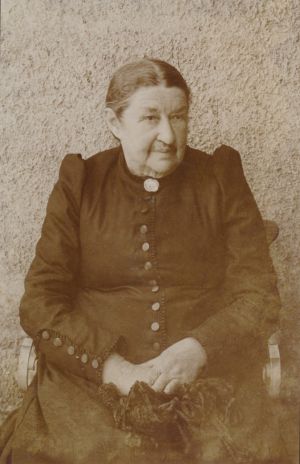Translations:Henriette Eckart (Da VII 1)/6/en
After Uncle Philipp, for whom she continued to keep house following his wife’s death, had also died, she relocated from Altenburg to Nuremberg, to his daughter, her beloved goddaughter Henriette Reuter, who ran a tea and coffee store there after her husband’s death. There, she managed the household and took care of the young children. The store did not thrive and was relinquished after having existed for only a short time. Jette Reuter, who had accommodated some of her children in schools and the others in apprenticeships, first came to Niederaltenburg, where she ran a guest house, then to Uncle Fritz in Munich where she took care of his household. Aunt Jette came to us and stayed until her death. During these years, we children, while growing up, came to really appreciate and love her. Thanks to her unfailing fine tact, her thorough noble-mindedness, her rare intellect, and her kindness, she made friends everywhere. That is why her lounge, with the cozy Biedermeier furniture inherited from her mother, was often teeming with visitors. As confidante of so many family members, she has witnessed numerous human fates, has walked the simplest as well as the most tortuous ways with them in caring sympathy, so that nothing human was alien to her. She, who remained unmarried, was full of understanding and offered advice and comfort for every sorrow. Her rather unattractive face, which was particularly disfigured by a mustache, won general sympathy owing to her expression of great intelligence and kindness. She was rather quiet – being of the Eckart nature, she did not like to talk a lot – but always found the right way of providing comfort, and those who opened their heavy hearts to her were calmer when they left. Those whose heads she stroked with her dear, beautiful hands in an almost timid way – for, being of the rather severe maiden type, she also did not like to openly show affection – were aware of so much faithful and compassionate love that they felt they were in the right place. In retrospect, I now admire the understanding that she, already well advanced in years, showed towards the women’s movement, which was in a very early stage at that time; a movement, which faced stronger resistance among considerably younger people and the development of which she, in her seventies, desired with the utmost ardor.
